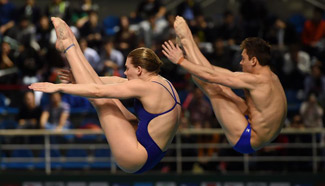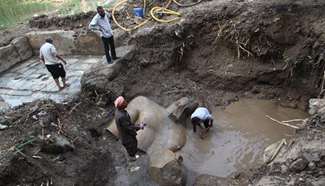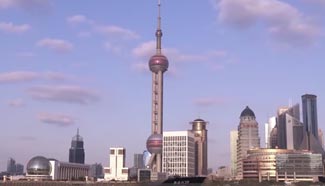by Keren Setton
JERUSALEM, March 10 (Xinhua) -- Israel is wavering in a delicate political balancing act amid meeting between Israeli Prime Minister Benjamin Netanyahu and Russian President Vladimir Putin, an expert said Friday.
Israel would be left empty-handed if it asks for a major shift in regional allegiances or Russian promotion of Israeli interests, said Gideon Remez, a researcher of the Truman Institute at the Hebrew University of Jerusalem, despite a reality of converging interests for the two countries amid the Syrian civil war.
"Russia has no interest in provoking Israel, but it also see no necessity to stand on Israel's side," he said.
Israel finds itself on the sidelines over Syrian issue, not a major player, and Russia's interests in the Middle East are rarely synchronized with Israel's.
The meeting of Netanyahu and Putin on Thursday in Moscow is the fifth time in the past 18 months. The two discussed the situation in Syria and also, Iran's role in the region.
Iranian involvement in Syria is a major cause for concern in Israel, while being a Russian interest.
Days before the meeting, Netanyahu opened his cabinet session by saying he will express "Israel's sharp and vigorous opposition" to increased Iranian military presence on its border.
Iranian leaders have repeatedly called for the destruction of the Jewish state.
Speaking at the end of the meeting, Netanyahu said he told Putin that Israel would not accept Iranian presence in Syria after any settlement. The Israeli PM later told journalists that the Russian leader had "internalized" his message.
Remez noted that he is wary of Israeli reports coming out of the meeting, as there was no press coverage during the meeting, saying that he has difficult in imagining a situation in which Netanyahu lectured Putin.
"It is an illusion that Russia will steer its policy according to Israeli requests," Remez said. "Israelis are in for a rough awakening if that is what they believe."
Israel's border with Syria has been relatively quiet for years, even though officially the countries are at war with each other.
Israel captured the Golan Heights from Syria in the 1967 Mideast war. Israel annexed the territory, a move that is not recognized internationally.
In a press release issued before the meeting, the Israeli PM said the issue of the Golan Heights was off the table.
Syria has said that it wants the territory back, while in a meeting between Netanyahu and U.S. President Donald Trump last month, the Israeli leader said he had asked the U.S. to recognize the Israeli annexation of the territory.
This request, largely stemmed from internal political struggles Netanyahu is involved in, is also hardly objected by Syria's Assad as he has been too busy dealing with his internal strife.
The U.S. response to the request was not clear.
Remez believed the issue of the Golan Heights was raised despite it being "beyond the horizon" because Israel is concerned that a revitalized Assad may have new energy to confront Israel.
"If the Russians succeed in restoring Assad to power, they will start backing his claim to get the Golan back," said Remez. "Russian policy is absolutely clear, it has never recognized the annexation."
In recent years, there have also been several reports that the Israeli air force has struck in Syria militant groups transporting weapons to be used in future attacks on Israel. The most recent was a few weeks ago, when a convoy carrying weapons for the militant Hezbollah group was destroyed by Israeli fighter jets.
Israel did not confirm or deny these reports.
Until now, supposed Israeli attacks have gone with no response from Syria, but this may not be a sustainable reality. "Once the Assad regime is more or less stabilized, Assad may tell the Russians that this can't go on," Remez said.
While Israel has accepted Russian involvement in Syria, it has repeatedly said that it will not hesitate to take action against militant groups such as Hezbollah. Iran has been critical in the armament of the militant group based in Lebanon.
"Russia will not prevent Assad's support for Hezbollah. I suspect proxy action from Lebanon will resume," said Remez, who believes a reinforced Syrian leader will support renewed attacks on Israel.
Russian involvement in Syria increased significantly since it stepped in with direct military presence in September 2015. Russia is at odds with a large part of the international community which wants to see Assad step aside as Syria's leader.
Therefore, Iran, also interested in maintaining Assad's hold on the war-torn country, is a critical partner for Russia, with mutual interests greater than any benefits they can reap from an alliance with Israel.
With the lifting of sanctions against Iran as part of the nuclear deal, Russia has "gained a lot," said Remez.
For Israel, while Assad may be the lesser evil to have on its hostile northern border, Iranian presence in Syria is a difficult pill for Netanyahu to swallow. Thus, cooperation with Russia is clearly a strategic Israeli interest.
Russia is heavily involved in talks aimed at shaping the future of Syria, and any settlement is critical for Israel, which is seeking any influence it can get on the matter, Remez said.












